This Summer in Jerusalem
Dovid Teitelbaum
Director, Camp Sdei Chemed and Camp Kedma
Since my father, Rabbi Eli Teitelbaum z”l, started Camp Sdei Chemed in 1969, there were very few instances when we had to cancel. My father would say that if he had a minyan of boys who wanted to join and parents willing to send them, he would open the camp. Despite a year filled with uncertainties, by the time this summer arrived, we had a full bus of boys and another bus of girls in our Kedma program. Let me tell you about our summer experience touring Eretz Yisroel and what it meant to us.
Yama VaKedma
We toured from Eilat in the south to Tzfat in the north. Everything above Tzfat is considered within normal rocket range from Hezbollah. It’s devastating that everyone in those towns and cities have been forced out of their homes over the past year, but from a touring perspective, it wasn’t a big issue. We were advised not to visit Rosh Hanikra, the Chermon, Akko, and Meiron. When you get close to the north, something strange happens that reminds you a war is ongoing. Israel scrambles your GPS signal, making it appear as if you are in Lebanon. This might make your heart skip a beat until you realize it’s just a fluke. They say Israel does this to confuse Hezbollah’s attack drones, which use GPS for navigation. We had an interesting time teaching our kids to navigate roads the old-fashioned way, without GPS. Also, don’t fly your DJI drone — it’s likely to end up at Beirut airport. I speak from personal experience.
Wherever we did go, we were welcomed with tremendous warmth. People with tears in their eyes thanked us for coming. Whether it was donkey riding in Kfar Kedem or grape juice making in Katzrin, they were thrilled that we came. I think it’s important to mention this because even if we had only visited the holy places, the beautiful Mediterranean beaches, climbed Masada, and rappelled down the Jilabon, it would have been worth it for us and the campers. Initially, I thought we would feel guilty having a great time while the country is still at war. That’s definitely not how the locals felt. They wanted to know that those of us in the diaspora had not abandoned them.
While we had an amazing time, there were moments that felt like we were on a shiva call, as if we had come to Israel to comfort and lift the spirits of those there. Like a shiva call, there was nothing we could say, but just being there made all the difference. Every time you meet an Israeli, there’s this sort of unspoken understanding – anochi b’tzara — and they know what you mean. It’s hard to tell who has lost a loved one or who has a child fighting in Gaza, but you are there for them, and if you stop to talk, they’ll tell you their story. Different communities have been affected in different ways, and each has its own story, so you stop and listen.
Staying Safe
When I tell people that we toured most of the country for two months and didn’t hear a single siren, they seem surprised. Anyone who has been in Israel during a war or conflict knows that what’s reported in the news and what it actually feels like on the ground are often very different. I wish I could give you tips on how to stay safe from terrorists, but terrorism is a unique kind of danger. You can’t really prepare for it; you never know when or where it will strike. There are real dangers we need to be careful about during the summer — like dehydration, drownings, and car accidents. These are things we can mitigate by wearing life jackets, drinking enough water, and not using our phones while driving. But would you blame someone for going to work at the World Trade Center on 9/11, or for attending a music festival in Karnei Reim? What about a typical American child going to school and ending up in a school shooting? Would you stop sending your child to school? I think we are all baffled when we hear news reports advising us to “stay vigilant and report suspicious behavior.” It’s just not realistic. Terrorism is designed to instill fear, and we each decide how much we allow that fear to affect us.
Reflections
At the end of the summer, Elisheva and I decided to visit the kibbutzim around Gaza. I believe some of them are still empty, while others have seen some residents return. They were all closed and heavily guarded. My assumption is they don’t want visitors. Instead, we drove to Sderot, a large city just a few miles from Gaza, where Hamas militants massacred at least 50 civilians and 20 police officers. There’s a hilltop in Sderot with a clear view of Gaza. It looks completely gray and in ruins. “Apocalypse” is a more fitting term. And yet, I didn’t feel much empathy. I pictured a large banner hanging over Gaza with the words “The Former Terrorist State of Gaza”. Hashem Yikom Damam—may God avenge their blood.
Throughout the summer, I asked others why they came to Israel and whether they were nervous or worried about being there. The answer was always the same: “I don’t really feel safe anywhere as a Jew today, but at least here is where I belong.” Baruch Hashem, in our small enclave in Marine Park, we are safe from antisemitism. I can put a “We Stand with Israel” sign on my front door and not face any backlash. But just a little further out, there’s a different reality. When I park my car near Kensington, my Israel flag gets torn down. It’s happened more than ten times. Before the summer, there was a Palestinian demonstration around the corner. For many, October 7 was a wake-up call. For me, it was October 8 when thousands of New Yorkers gathered in Times Square to stand in solidarity with Palestine in a demonstration they called “Flood NYC,” named after the Hamas operation “Al-Aqsa Flood.” And so, while I can’t tell you where it’s safer to be right now, I can tell you that in Israel, you will feel welcomed and surrounded by your brothers and sisters who love you, and they will risk their lives to protect you.
L’shana Haba’ah B’Yerushalayim — next year in Jerusalem.
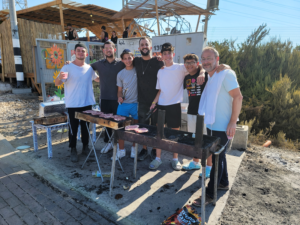
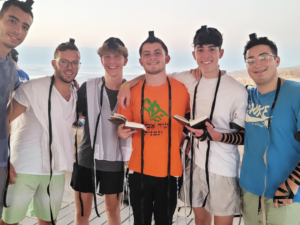
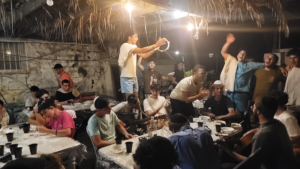
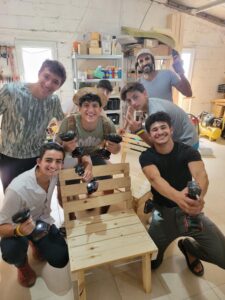
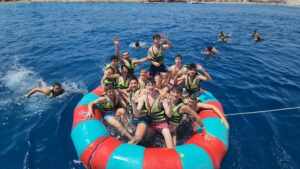
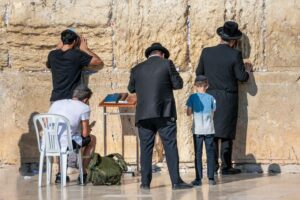
Snippets of Our Summer
Hostage Square
In Tel Aviv, next to the art museum, there’s a large area dedicated to reminding people of the hostages still held in Gaza. Pictures and memorabilia are all around. You can visit to learn more about the hostages, sometimes from their close family and friends. There’s even a VR experience where you can “become” a hostage. But honestly, you can and should visit just to show that you care. We found a beautiful spot for a kumzitz where we could talk and listen. Jews from all over, including a Chassidish girls’ Birthright group, were there.
Tzfat
Two of our most meaningful Shabbos experiences each summer are in the Old City, where we daven at the Kotel, and in Tzfat. Tzfat is one of the four holy cities, but it’s more than that—it’s an experience that transforms our campers. That’s why it was such a difficult decision whether or not to visit this summer. Many groups stayed away, and I don’t blame them. Tzfat is in the north, but it’s located on the border of what Israel calls the “safe zone.” Just a few kilometers away is Meiron, which is often targeted by rockets because of the army base at the top of the mountain. If you pay attention, you can often see and hear rockets — or, more frequently, the Iron Dome intercepting them. After much deliberation, we decided to go. Visiting was only part of the problem; dealing with the fact that Tzfat would be empty was a bigger concern. The artist colony would be closed, and the shuls would have fewer visitors. How would that affect the experience?
I decided to publicize our visit to the Tzfat community and let them know that if anyone wanted to open their shops for us, we would be happy to visit. They accepted our offer. Word spread quickly, and I was flooded with immense gratitude from the community. I won’t lie—it was eerie walking around Tzfat over Shabbat. I’ve never seen the Old City so empty. There were no tourists, but we got to spend more time with the locals than we usually do, and they were ecstatic that we came and spent time with them.
Nova Memorial
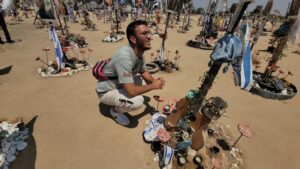
At the site of the Nova festival massacre at Karnei Reim, there is a memorial. It’s a wide-open field now decorated with memories of the 364 souls who were killed and more than 40 hostages who were taken. We arrived early, and when we got off the bus, it was perfectly quiet. It felt like someone had pulled the plug at a simcha hall and everything went still. It’s not graphic, but it’s so recent that it feels almost tangible. The wall of burnt cars was shocking and disturbing.
Some say it’s important to visit as a form of testimony to a world that will deny October 7 ever happened. Others visit because it’s a site where Jews died for being Jewish. Whether one should visit depends on your emotional state. We waited until the Nine Days, when we felt our campers could process it better. I’ve never watched any of the gruesome videos from October 7 — I can’t even imagine the horror. I think about what it would be like to lose a loved one in such a barbaric way, and my mind just shuts down. But I’ve learned that everyone processes it differently. Some use the time to reflect. We cried. We listened. We sang.
Shuva Brothers (Shuva Junction)
I knew it was important to dedicate one day this summer to expressing our gratitude to the IDF soldiers who are risking their lives so we can tour Israel safely. Most groups hold a BBQ, but I wanted to do more. I was introduced to Shuva Achim (Three Brothers). Shuva created a rest stop in the Gaza envelope for soldiers fighting in Gaza, where they can relax and be spoiled for a few minutes between missions. With a simple WhatsApp status, we raised over $5,000. That money was used to provide a five-star BBQ for the soldiers and to purchase materials to build a swing and some benches for the growing outpost. Our campers went to work – cooking, building, singing, dancing, and interacting with the soldiers. Since it was the Nine Days, we had a beautiful siyum by one of our campers to boost the spirits. We interacted with the soldiers and the many volunteers from all over the world who came to help and show appreciation. We heard stories — stories of “ordinary” Israeli citizens battling Hamas terrorists, stories of loss and pain, stories of ahavas yisroel that we witnessed firsthand. Shuva was just a short drive from Netivot, so I made it a point to stop at the kever of the Baba Sali for mincha. We don’t often visit this part of Israel, so I wanted to make the most of it. We made a lechaim with the grandson of the Baba Sali (at least, he said he was) and then headed back to Yerushalayim.
Erev Tisha B’Av
On Erev Tisha B’Av, we had the privilege of hearing from Jennifer Airley, who lost her son Binyamin while he was fighting as a hero in Gaza. Binyamin sounded like a typical teenager, and the way Jennifer has processed her grief — by building a retreat center in Tzfat in her son’s spirit and honor — has been an inspiration to all of Am Yisrael. She spoke openly from the heart, with extraordinary strength and faith. After she spoke, we went to “Tachlit” to help pack packages for families in need. I also took a small group of boys to Tel Hashomer Rehabilitation Center in Tel Aviv to visit injured IDF soldiers. Our mission was simple: to visit the sick, to let them know we care, and to remind them that the sacrifices they made had a purpose — that we are in Israel, touring and having a great time, because of them. Each one of them had a fascinating story. Each one survived through miracles. There were lone soldiers and soldiers who seemed very young. Some had lost limbs, and others would be in therapy for a long time. I felt ready for Tisha B’Av.
Evacuees
We stayed in several hotels over the summer, and one of the most striking things was the large sign at the front desk that read, “This hotel is free for evacuees.” Seeing that evoked mixed feelings. How did we get to the tragic point of having displaced people in our own land? Yet, it’s also a testament to the incredible work Israel has done to provide these people with places to live and be cared for. The Palestinians are used as pawns by the Arab world with the sole purpose of destroying Israel. Despite the horrendous conditions in Gaza, no Arab country will take them in. But we take care of our brothers and sisters. Biyachad Ninatzeiach — together we will triumph. I don’t think that just means we will win the war. The outpouring of love between Jews is simply incredible. That is winning.
Kfar Etzion
I would be remiss if I didn’t mention the beautiful Shabbos we spent at Kfar Etzion. Recently, I’ve become more interested in visiting places in Israel that aren’t on the typical tourist list. Gush Etzion, or “the Gush,” refers to the land mass mostly between Yerushalayim and Chevron, which many consider the heartland of Eretz Yisroel — what the UN calls illegal settlements. I encourage everyone to visit the Gush Etzion Visitor Center to learn about the history. If you do, you might notice the igloos—or as we like to call them, “Smurf houses.” nearby. We slept in these huts. They were actually quite lovely inside, more like a glamping experience. Due to the war, there was a last-minute cancellation, so I took advantage of the opportunity and brought the camp there for Shabbos. Some say it wasn’t about the camp but about my family scouting new places to live one day — but those are just rumors.
This area might sound dangerous in the news, but it’s been one of the quietest regions since October 7. They aren’t targeted by rockets, and the IDF has boosted security around all the settlements. Plus, everyone over Bar Mitzvah is carrying an M16. On Shabbos afternoon, we walked to Alon Shvut, davened mincha at Yeshivat Har Etzion, and heard from Rabbi Moshe Taragin. There’s something about the people who live in the Gush that inspires me. I don’t know how to explain it, but their Yiddishkeit feels more authentic. It’s important to counter the narrative that people living there are extremists; nothing could be further from the truth. These are some of the most down-to-earth, happy families — accepting of everyone — and they simply want to live in peace in our ancient homeland. The best word I can use to describe life there is “idyllic,” and my campers picked up on that as well.
You must be logged in to post a comment.